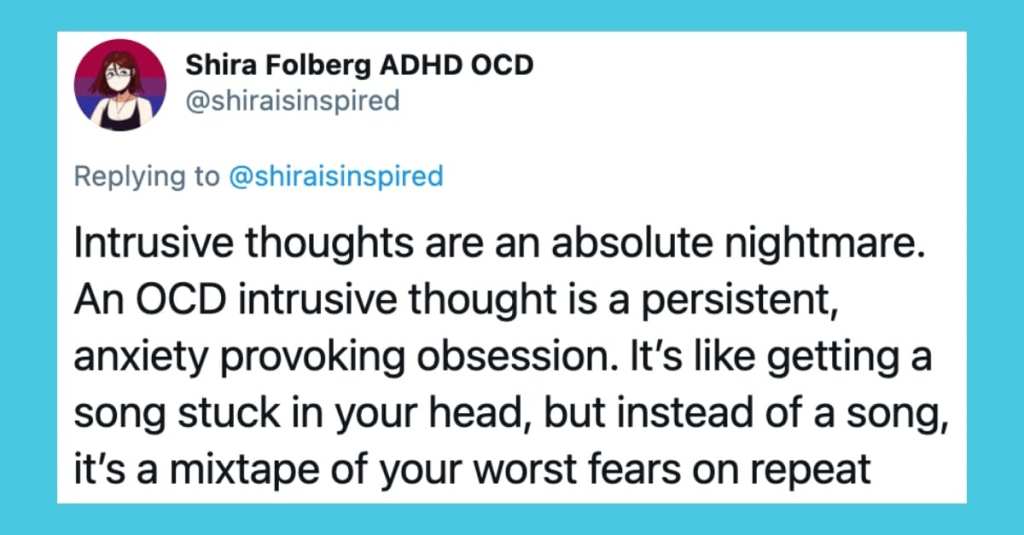I’ve spent time around people who struggle with Obsessive-Compulsive Disorder (OCD) and all I can say is that is really terrifying and heartbreaking to see them struggle with something that the rest of us really won’t ever be able to understand.
And people who have had to deal with OCD directly or indirectly also know that it is rarely if ever portrayed in the media correctly. A woman named Shira Folberg took to Twitter to explain to people what it’s really like to live with OCD.
Here’s how she started her informative thread.
https://twitter.com/shiraisinspired/status/1305226398387310592?ref_src=twsrc%5Etfw%7Ctwcamp%5Etweetembed%7Ctwterm%5E1305226398387310592%7Ctwgr%5E&ref_url=https%3A%2F%2Fwww.distractify.com%2Fp%2Fwhat-ocd-is-really-like
And Folberg described how truly hard it is to live with the condition.
Let me start by being blunt: OCD fucking sucks. It’s legitimately the worst thing that’s ever happened to me. I would not wish it on my worst enemies. I mean that sincerely.
— Shira Folberg ADHD OCD (@shiraisinspired) September 13, 2020
Once something gets stuck in the head of a person with OCD, it turns into a nightmare.
Intrusive thoughts are an absolute nightmare. An OCD intrusive thought is a persistent, anxiety provoking obsession. It’s like getting a song stuck in your head, but instead of a song, it’s a mixtape of your worst fears on repeat
— Shira Folberg ADHD OCD (@shiraisinspired) September 13, 2020
And folks worry about things that are totally irrational and out of character for them.
OCD intrusive thoughts are ego dystonic, which means they don’t align with your values. ‘What if I accidentally poison my family?’ ‘What if I take this knife and stab my partner in the back?’ ‘What if I drove my car off a cliff right now?’
— Shira Folberg ADHD OCD (@shiraisinspired) September 13, 2020
And that causes OCD sufferers to keep these things to themselves because people will most likely not understand what they’re going through.
The fact that they’re ego dystonic makes them terrifying to share with anybody. Because what if they take you seriously? What if they confuse your worst fears with your legitimate values or intentions? It’s petrifying
— Shira Folberg ADHD OCD (@shiraisinspired) September 13, 2020
And this leads to compulsive behavior to try to get rid of the awful thoughts that OCD sufferers can’t stop.
Compulsions are compulsive attempts to get rid of your intrusive thoughts. Ex: I’m scared of getting sick, so I wash my hands. But doing compulsions only makes your OCD worse! So why do you do them? Because OCD is a tricky son of a bitch.
— Shira Folberg ADHD OCD (@shiraisinspired) September 13, 2020
And it continues on and on in a terrible cycle.
It’s a vicious cycle, and it’s miserable. Your compulsions relieve your anxiety momentarily, but the thoughts always come back worse. So you do another compulsion. And your anxiety gets even worse. And so on and so on and so on.
— Shira Folberg ADHD OCD (@shiraisinspired) September 13, 2020
Folberg describes how she has to hide her compulsive behavior when she’s out in public.
Hiding your OCD in public is a bitch, especially when you have overt compulsions like tapping or blinking. You know that hypothetically you could just stop, but you can’t. It’s too risky. So you find ways to mask your compulsions. You make up excuses.
— Shira Folberg ADHD OCD (@shiraisinspired) September 13, 2020
And it is a very exhausting cycle.
And that making excuses is exhausting. All of it is exhausting: the obsessions and the compulsions and the hiding and the fear of judgement. And since it’s so hard to open up about OCD symptoms, some people go decades undiagnosed.
— Shira Folberg ADHD OCD (@shiraisinspired) September 13, 2020
OCD can be so consuming that it leads to depression.
You can get depressed. The more that OCD takes over your life, the more depressed you get. Because when you’re spending all day obsessing and compulsing, you’re not really living your life. And that’s devastating.
— Shira Folberg ADHD OCD (@shiraisinspired) September 13, 2020
And that’s why it’s important for people who don’t suffer from OCD to understand the terrible anguish that these people go through every day.
The point of this thread isn’t to be a total bummer. The point of this thread is to educate. Because keeping your mental illness to yourself is hard, but stigma can make speaking up even harder.
— Shira Folberg ADHD OCD (@shiraisinspired) September 13, 2020
Folberg talks about how sometimes people dismiss the mental illness because they don’t actually understand what it means.
Do you know how frustrating it is to finally work up the courage to disclose your OCD, only to be told, “oh, we’re all a little OCD”? It’s awful. And the possibility of being dismissed discourages people in need of help from reaching out.
— Shira Folberg ADHD OCD (@shiraisinspired) September 13, 2020
This pretty much sums OCD up.
— Shira Folberg ADHD OCD (@shiraisinspired) September 13, 2020
And here’s one edit she made about the way OCD is represented in the media.
Edit: Monica was never ‘diagnosed’ with ocd, but it was insinuated. I’m not trying to diagnose fictional characters, y’all. And that’s not the point of the thread
— Shira Folberg ADHD OCD (@shiraisinspired) September 13, 2020
Finally, if you struggle with OCD and you need to talk to someone, reach out to this organization for help. There’s no shame in recognizing your issues and working through them.
— Shira Folberg ADHD OCD (@shiraisinspired) September 13, 2020
Do you have any experience dealing with OCD?
Or maybe someone close to you has dealt with it?
If so, please talk to us in the comments and tell us about it. Thank you in advance.






